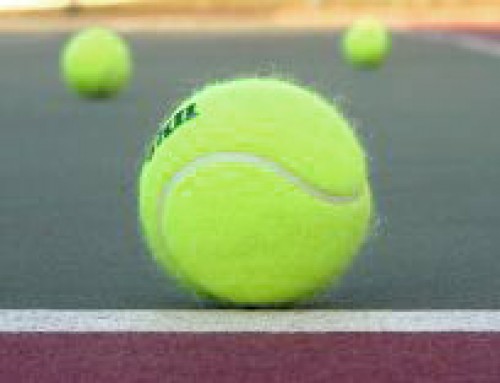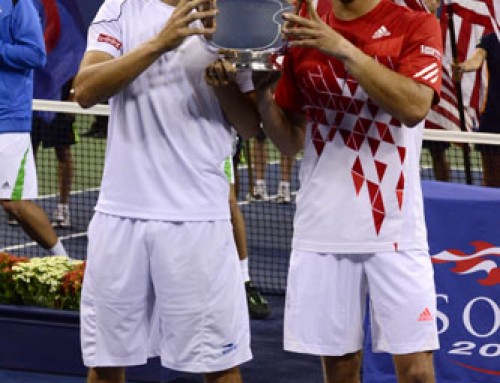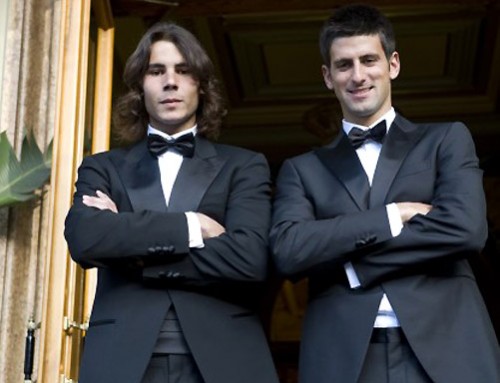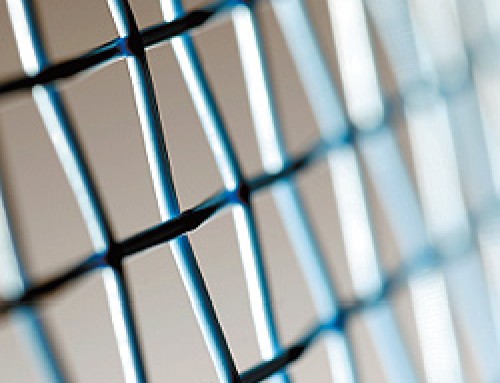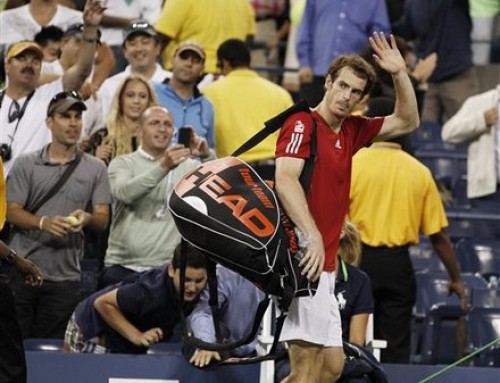 Roger Federer was on the verge of a 16th Slam. He was on the verge of 6 straight US Opens. There were a few things going for Roger. First, the history of winning so many finals. Second, never having lost to Juan Martin del Potro.
Roger Federer was on the verge of a 16th Slam. He was on the verge of 6 straight US Opens. There were a few things going for Roger. First, the history of winning so many finals. Second, never having lost to Juan Martin del Potro.
And yet, despite a nice win over Djokovic, it was a not-great Federer playing just a bit more solidly than a not-great Djokovic. Federer didn’t exactly dominate Djokovic. He just played the big points well.
Although Federer started off quickly, getting an early break, and then taking the first set, 6-3. In the second set, Federer again got an early break and it looked like he’d take control of the match. Federer will look back at the 5-4 game and wonder how he lost the second set. At 30-0, Federer gets in a rally and nets a slice. 30-15. Then, he went to net and hit an ill-advised drop shot that lead to a lob over Fed’s head, and it seemed Roger would hit another tweener, but hit a behind the back lob that lander long, 30-all.
Then, Roger approached the net, and del Potro hit a hard shot down the line that was called wide, but on replay, it clipped, 30-40. Roger again approached the net and del Potro again passed a second time to secure the break back, at a point when Roger seemed totally in control of the match, and right at the edge of taking a 2 set to none lead. If Roger watches this match again, he’ll point to the 5-4 game which he attacked too much to the del Potro forehand.
del Potro would start to hit better and forced the match into a tiebreak. There, he took the tiebreak 7-5.
With the match knotted at one set each, it wasn’t clear which way the match would go. When it clearly seemed as if Federer would take the match easily, the match was, instead, tied.
In the third set, Federer got a late break to go up two sets to one. It seems only a matter of time before Federer takes the match. The mistake in the second set didn’t seem quite as costly, but the damage had been done. Federer’s game was starting to fall apart. Federer tends to start matches quickly, but he’ll often start to make more mistakes as the match progresses, almost as if he has a limited time to play great tennis and when that time passes, his game becomes erratic, still good enough to beat most players, but not a player that’s on.
Only it didn’t work out that way. At 2-all in the fourth set, del Potro gets a break. However, Federer breaks back to 4-all, and the two head to a tiebreak. Federer ends up losing this set in a tiebreak hitting a forehand wide.
In the fifth set, del Potro secured an early break to go up 3-0. It seems he’s fatigued, but Federer is not doing his cause much good by missing first serves and not pressuring del Potro on his own serve. At 5-2 down, Federer falls back 15-40, gets the match back to deuce, then double faults, misses a first serve, and hits a backhand long to give del Potro a second break and the match.
del Potro did a few things well. First, his forehand was humming. Currently, he possesses the biggest forehand in the game. We’re talking about both power and consistency. del Potro can hit 110 mph forehands, and this left Roger hitting squash shot forehands all night long. It seemed like del Potro’s fitness would come into play, but with an early break in the fifth, del Potro didn’t have to play tough on every Federer game, and gave a few up to get rest.
Federer, for his part, served rather poorly. Hitting only 50% of his serves, he put in second serve after second serve. Federer is still good enough that he can win with a bad first serve percentage. However, his average percentage was over 60% over his 5 previous wins. If he had hit 60% or more, he would likely have held his serve more easily. Federer also started losing control of his forehand and even backhand in the latter parts of the fourth set and in the fifth set. del Potro simply kept his head together longer, and Federer failed to produce a great match that he’s capable of.
What’s more, Federer threw in an uncharacteristic number of double faults. Even if Federer has a bad serving percentage, he rarely serves doubles faults. He served 11, which is starting to be Maria Sharapova territory (admittedly, she makes nearly twice as many doubles faults in a best of 3 set scenario).
Although Federer lost, he did not shed any tears. He felt he had a good US Open, and while he played bad, it wasn’t a loss to Nadal, and he’s certainly won plenty of US Opens. del Potro found it hard to contain his emotions.
del Potro is now looking far and away the “best of the rest”. Once you get past Federer and Nadal, you have Murray, Djokovic, and del Potro. del Potro appears to have the most upside, having the biggest game of the three, but it’s very possible all three will be contending for titles, once Federer gets closer to retirement. Another big question is the health of Nadal. Nadal spent Wimbledon and another month trying to recover. He’s likely to spend at least one more month trying to recover from his abdominals. His body appears to be breaking down, or at the very least, he seems a bit unlucky.
Finally, the US Open audience needs to shut up during serves. They called a fault during a serve by del Potro, which lead to Federer being given an opportunity to call a late challenge only to find the serve was indeed long. As it turns out, del Potro held his serve in that game, so it didn’t change the outcome of the game. The chair umpire did a weak job of controlling the audience and let them utter what they wanted. To be fair, we’re talking about a handful of unruly fans who felt the need to affect the outcome of matches.
Well, it’s the end of another US Open, another Monday US Open. Only time will tell whether it’s the passing of the torch from Federer to the newcomers. Had he won the match, we would be proclaiming Roger as a juggernaut. Since it’s the same Roger Federer, the question is whether he can clean up his game and play more like he did at Wimbledon rather than the way he played at the US Open.
Congratulations to the 2009 US Open champion, Juan Martin del Potro. You’ve accomplished a feat that only Nadal accomplished–beating Roger Federer in a Slam final, and that puts you in rare company. Given his defeat of Rafael Nadal in the semifinals, he’s one of the few players to ever beat both players in the same tournament, and probably the first to beat both in a Slam.



